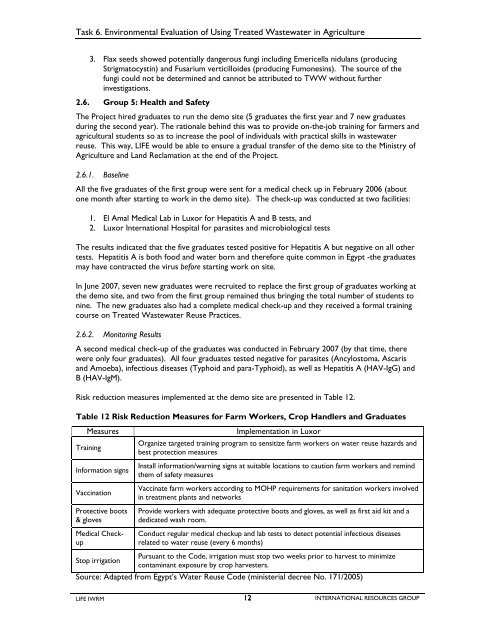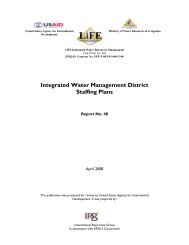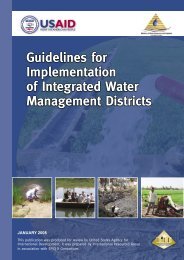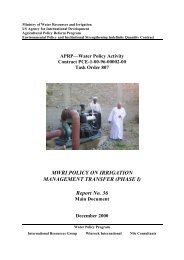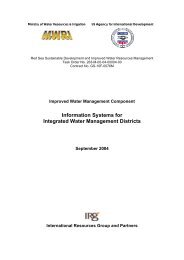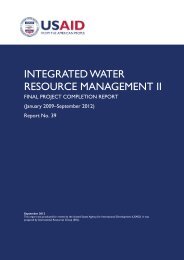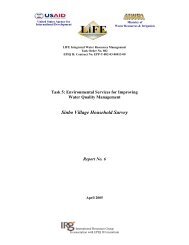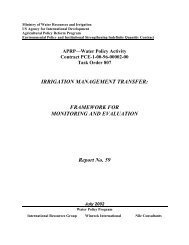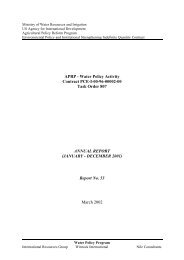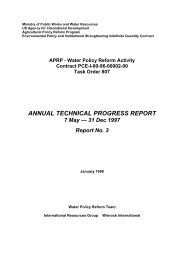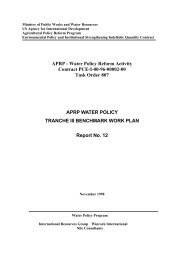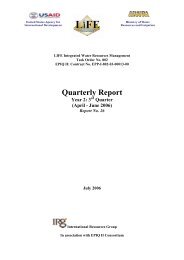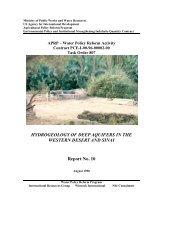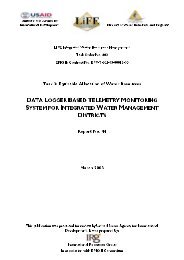Report 45 Task 6 Environmental Evaluation Luxor Demo Site
Report 45 Task 6 Environmental Evaluation Luxor Demo Site
Report 45 Task 6 Environmental Evaluation Luxor Demo Site
Create successful ePaper yourself
Turn your PDF publications into a flip-book with our unique Google optimized e-Paper software.
<strong>Task</strong> 6. <strong>Environmental</strong> <strong>Evaluation</strong> of Using Treated Wastewater in Agriculture<br />
3. Flax seeds showed potentially dangerous fungi including Emericella nidulans (producing<br />
Strigmatocystin) and Fusarium verticilloides (producing Fumonesins). The source of the<br />
fungi could not be determined and cannot be attributed to TWW without further<br />
investigations.<br />
2.6. Group 5: Health and Safety<br />
The Project hired graduates to run the demo site (5 graduates the first year and 7 new graduates<br />
during the second year). The rationale behind this was to provide on-the-job training for farmers and<br />
agricultural students so as to increase the pool of individuals with practical skills in wastewater<br />
reuse. This way, LIFE would be able to ensure a gradual transfer of the demo site to the Ministry of<br />
Agriculture and Land Reclamation at the end of the Project.<br />
2.6.1. Baseline<br />
All the five graduates of the first group were sent for a medical check up in February 2006 (about<br />
one month after starting to work in the demo site). The check-up was conducted at two facilities:<br />
1. El Amal Medical Lab in <strong>Luxor</strong> for Hepatitis A and B tests, and<br />
2. <strong>Luxor</strong> International Hospital for parasites and microbiological tests<br />
The results indicated that the five graduates tested positive for Hepatitis A but negative on all other<br />
tests. Hepatitis A is both food and water born and therefore quite common in Egypt -the graduates<br />
may have contracted the virus before starting work on site.<br />
In June 2007, seven new graduates were recruited to replace the first group of graduates working at<br />
the demo site, and two from the first group remained thus bringing the total number of students to<br />
nine. The new graduates also had a complete medical check-up and they received a formal training<br />
course on Treated Wastewater Reuse Practices.<br />
2.6.2. Monitoring Results<br />
A second medical check-up of the graduates was conducted in February 2007 (by that time, there<br />
were only four graduates). All four graduates tested negative for parasites (Ancylostoma, Ascaris<br />
and Amoeba), infectious diseases (Typhoid and para-Typhoid), as well as Hepatitis A (HAV-IgG) and<br />
B (HAV-IgM).<br />
Risk reduction measures implemented at the demo site are presented in Table 12.<br />
Table 12 Risk Reduction Measures for Farm Workers, Crop Handlers and Graduates<br />
Measures<br />
Training<br />
Information signs<br />
Vaccination<br />
Protective boots<br />
& gloves<br />
Medical Checkup<br />
Implementation in <strong>Luxor</strong><br />
Organize targeted training program to sensitize farm workers on water reuse hazards and<br />
best protection measures<br />
Install information/warning signs at suitable locations to caution farm workers and remind<br />
them of safety measures<br />
Vaccinate farm workers according to MOHP requirements for sanitation workers involved<br />
in treatment plants and networks<br />
Provide workers with adequate protective boots and gloves, as well as first aid kit and a<br />
dedicated wash room.<br />
Conduct regular medical checkup and lab tests to detect potential infectious diseases<br />
related to water reuse (every 6 months)<br />
Pursuant to the Code, irrigation must stop two weeks prior to harvest to minimize<br />
Stop irrigation<br />
contaminant exposure by crop harvesters.<br />
Source: Adapted from Egypt’s Water Reuse Code (ministerial decree No. 171/2005)<br />
LIFE IWRM 12<br />
INTERNATIONAL RESOURCES GROUP


